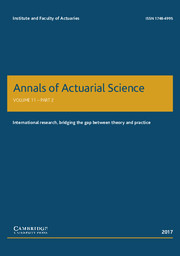Article contents
Application of a Polygenic Model of Breast and Ovarian Cancer to Critical Illness Insurance
Published online by Cambridge University Press: 10 May 2011
Abstract
Mutations in the BRCA1 and BRCA2 genes confer very high risk of breast cancer (BC), but only account for about 25% of the observed familial clustering of BC. Antoniou et al. (2002) proposed a model which included the BRCA1 and BRCA2 genes, and a polygenic component which acted multiplicatively on the rate of onset of BC. We use this model to find premium rates for critical illness insurance: (a) given knowledge of an applicant's polygenotype; and (b) given knowledge of a family history of BC or ovarian cancer. We find that the polygenic component causes large variation in premium rates even among non-mutation carriers, therefore affecting the whole population. In some cases the polygenic contribution is protective enough to reduce or remove the additional risk of a BRCA1/2 mutation, leading to cases where it will be advantageous to disclose genetic test results which are adverse in absolute terms. Premiums based on family history are lower than those found in an earlier study which attributed all genetic BC risk to the BRCA1/2 genes.
- Type
- Papers
- Information
- Copyright
- Copyright © Institute and Faculty of Actuaries 2006
References
- 4
- Cited by


